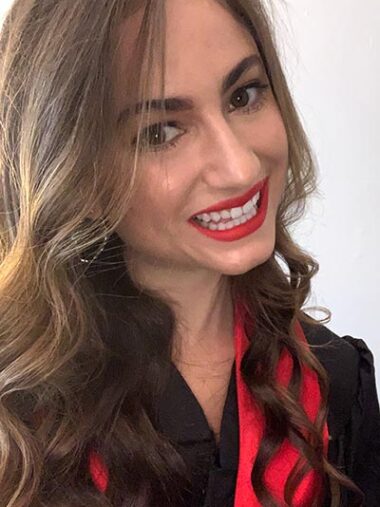
Marina Moskowitz
- AI/ML and Security Engineer, Apple
- BS in Computer Science combined with Business ’19
- Combined major
When Marina Moskowitz arrived at Northeastern University in 2014, she was undecided about her major. Although she knew she wanted to study business, she also wanted to explore her other passions. The combined majors program at Northeastern, which offered her the flexibility to pursue two disciplines, played a crucial role in her decision to attend the university.
One of her interests was computer science, but she had no prior experience in programming. So she enrolled in the course Fundamentals I at Khoury College, which introduced her to computing and programming.
“It was extremely difficult,” she said. “My brain was not used to thinking in that way, but I fell in love with the field because it taught me how to think objectively and independently.”
By the end of her first semester, Moskowitz declared a combined major in computer science and business. As she progressed in her studies, her focus shifted from pursuing grades to learning for learning’s sake. This allowed her to not only retain information better and understand the subjects more deeply, but also to explore them more extensively.
The success I have achieved is a direct result of my experiences at Khoury College, where I fell in love with learning. I was taught how to think objectively, at the most fundamental level, about what cybersecurity and artificial intelligence can do for us in the future
This refined ability to think quickly and apply her computer science knowledge became valuable during her four co-ops at the Department of Defense, as well as her two internships at Apple focusing on cybersecurity and machine learning. Although she had no experience in these fields, she was welcomed into these positions because of her aptitude for fast learning.
“I’m fortunate to have been in positions where I was given problems for which my manager said, ‘This doesn’t have a solution. If you fail, that’s okay,’” Moskowitz recalled.
Moskowitz explored these problems and soon fell in love with the work. By the end of her co-ops at the Department of Defense, Moskowitz had earned several awards for developing tools that the organization still uses. At Apple, during her first internship, she leveraged her skills in machine learning and natural language processing to create a tool that identified critical threats in Apple’s network. This tool was then implemented on a third-party vendor website, allowing anyone to benefit from the algorithm. During her second internship, she built upon this tool to pinpoint the location of vulnerable systems and machines within Apple’s network.
After each internship and co-op, Moskowitz returned to Northeastern to take advanced classes that allowed her to delve deeper into each new subject, further expanding her knowledge. Additionally, during her senior year, and under the supervision of Professor Alina Oprea, she conducted an independent research project in which she applied machine learning to find red flags in a network. She concluded her time at Northeastern having earned several awards, including being recognized as a Young Global Leader and as one of the most 100 influential students at Northeastern University (the Huntington 100).
Today, Moskowitz holds the position of AI and cyber security engineer at Apple’s Information Security department, where she writes algorithms to help protect Apple’s internal network from threats and vulnerabilities. Her focus is on reinforcement learning, an emerging field in artificial intelligence. She is also pursuing her master’s degree in machine learning and data science at the University of California, Berkeley.
Given the impact of rapid advancements in cybersecurity and artificial intelligence, Moskowitz believes that students exploring these fields must be prepared for a lifelong journey of continuous learning. She stresses the importance of students learning to think independently as they master foundational course material.
“The success I have achieved is a direct result of my experiences at Khoury College, where I fell in love with learning,” she said. “I was taught how to think objectively, at the most fundamental level, about what cybersecurity and artificial intelligence can do for us in the future.”